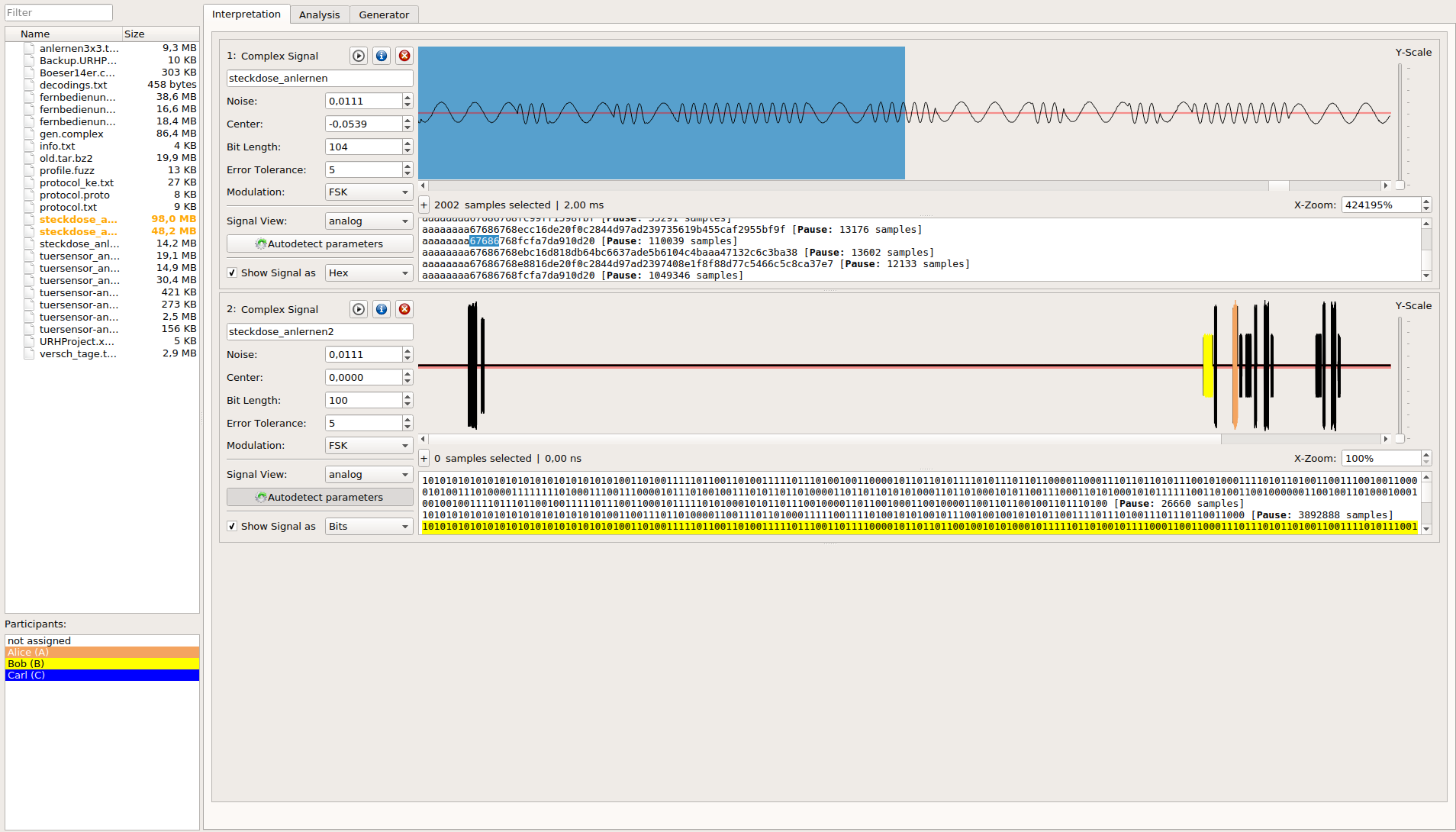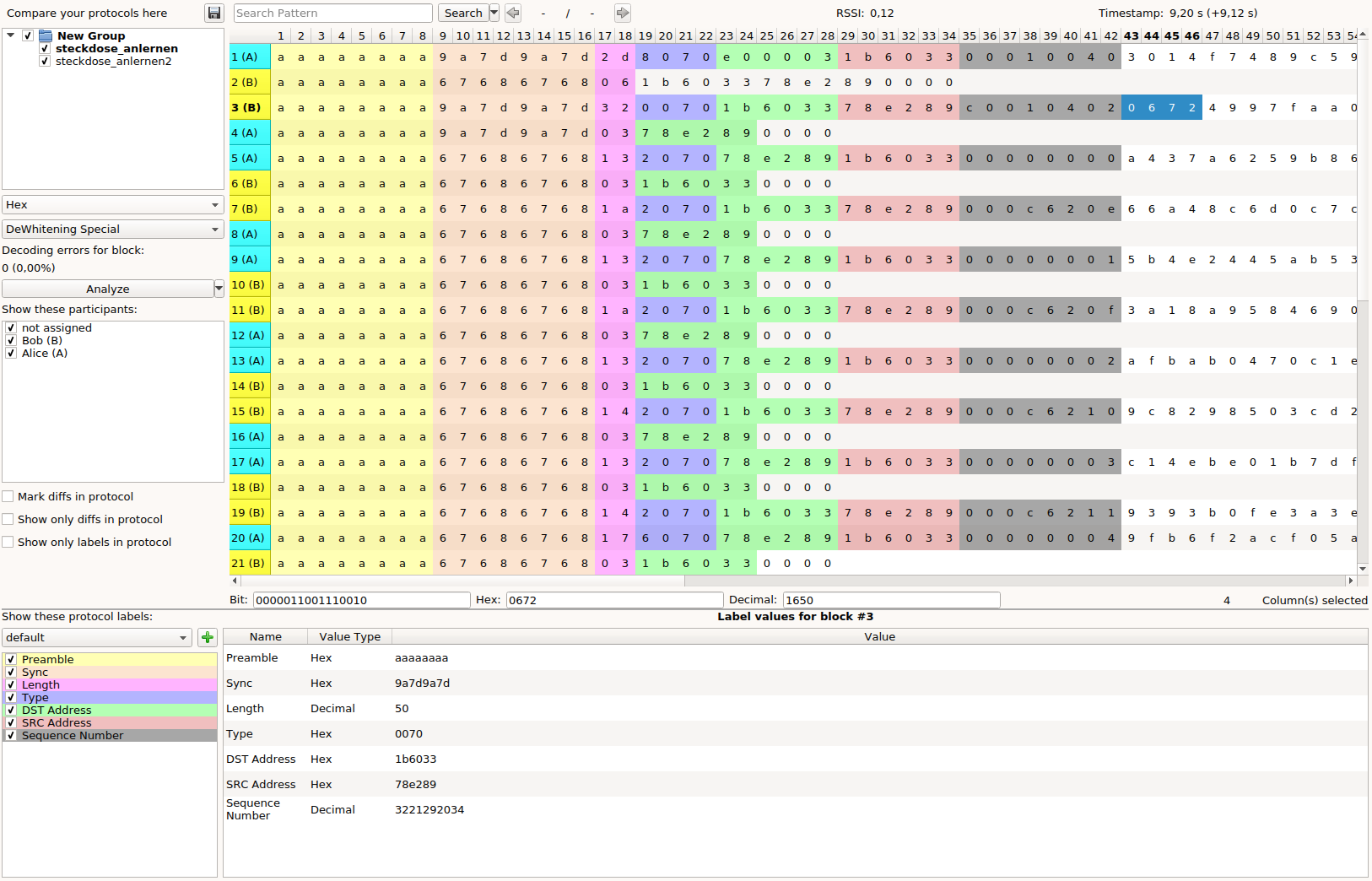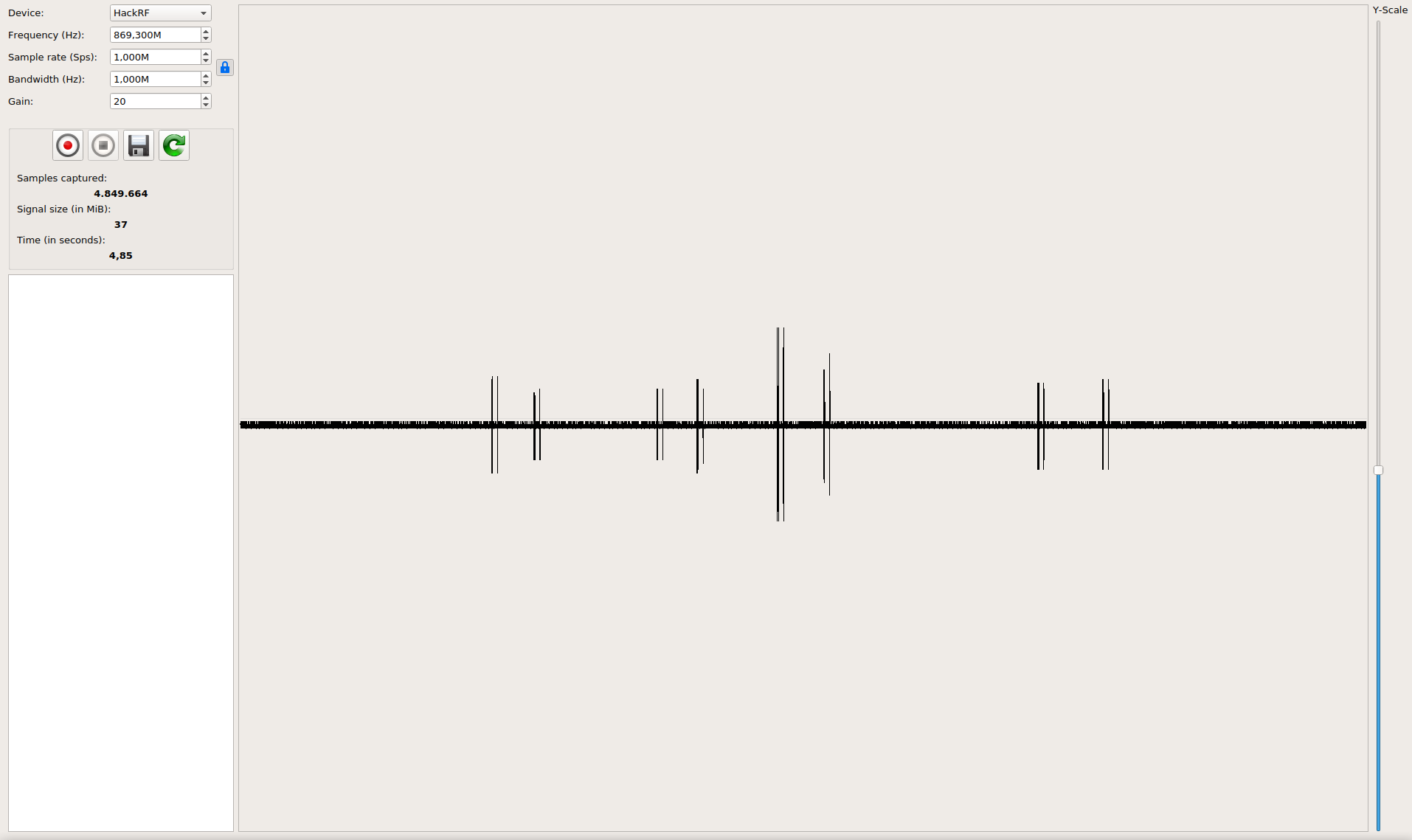Universal Radio Hacker: investigate wireless protocols like a boss
Project description
The Universal Radio Hacker (URH) is a software for investigating unknown wireless protocols. Features include
- hardware interfaces for common Software Defined Radios
- easy demodulation of signals
- assigning participants to keep an overview of your data
- customizable decodings to crack even sophisticated encodings like CC1101 data whitening
- assign labels to reveal the logic of the protocol
- automatic reverse engineering of protocol fields
- fuzzing component to find security leaks
- modulation support to send the data back to the target
- simulation environment to perform stateful attacks
Getting started
In order to get started
- view the installation instructions on this page,
- download the official userguide (PDF),
- watch the demonstration videos (YouTube),
- check out the wiki for more information such as supported devices or
- read some articles about URH for inspiration.
If URH is useful for you, please consider giving this repository a :star: or make donation via PayPal. We appreciate your support!
Want to stay in touch? :speech_balloon: Join our Slack channel!
Citing URH
We encourage researchers who work with URH to cite this WOOT'18 paper or directly use the following BibTeX entry.
@inproceedings {220562,
author = {Johannes Pohl and Andreas Noack},
title = {Universal Radio Hacker: A Suite for Analyzing and Attacking Stateful Wireless Protocols},
booktitle = {12th {USENIX} Workshop on Offensive Technologies ({WOOT} 18)},
year = {2018},
address = {Baltimore, MD},
url = {https://www.usenix.org/conference/woot18/presentation/pohl},
publisher = {{USENIX} Association},
}
Installation
Universal Radio Hacker can be installed via pip or using the package manager of your distribution (if included). Below you find more specific installation instructions for:
Windows
On Windows, URH can be installed with its Installer. No further dependencies are required.
If you get an error about missing api-ms-win-crt-runtime-l1-1-0.dll, run Windows Update or directly install KB2999226.
Linux
Generic Installation with pip (recommended)
URH is available on PyPi so you can install it with
# IMPORTANT: Make sure your pip is up to date
sudo python3 -m pip install --upgrade pip # Update your pip installation
sudo python3 -m pip install urh # Install URH
This is the recommended way to install URH on Linux because it comes with all native extensions precompiled.
udev rules
In order to access your SDR as non-root user, install the according udev rules. For example, you can install the HackRF udev rules with the following commands.
sudo tee -a /etc/udev/rules.d/52-hackrf.rules >/dev/null <<-EOF
ATTR{idVendor}=="1d50", ATTR{idProduct}=="604b", SYMLINK+="hackrf-jawbreaker-%k", MODE="660", GROUP="plugdev"
ATTR{idVendor}=="1d50", ATTR{idProduct}=="6089", SYMLINK+="hackrf-one-%k", MODE="660", GROUP="plugdev"
ATTR{idVendor}=="1fc9", ATTR{idProduct}=="000c", SYMLINK+="hackrf-dfu-%k", MODE="660", GROUP="plugdev"
EOF
sudo udevadm control --reload-rules
Make sure your current user is in the plugdev group to make these rules work.
You find rules for other SDRs by searching for "<SDR name> udev rules" in your favorite search engine.
If you still have problems accessing your SDR the Linux USB autosuspend feature might be interfering.
You can disable it by editing your /etc/default/grub as shown here.
Install via Package Manager
URH is included in the repositories of many linux distributions such as Arch Linux, Gentoo, Fedora, openSUSE or NixOS. There is also a package for FreeBSD. If available, simply use your package manager to install URH.
Note: For native support, you must install the according -dev package(s) of your SDR(s) such as hackrf-dev before installing URH.
Docker Image
The official URH docker image is available here. It has all native backends included and ready to operate.
MacOS
Using DMG
It is recommended to use at least macOS 10.14 when using the DMG available here.
With pip
- Install Python 3 for Mac OS X. If you experience issues with preinstalled Python, make sure you update to a recent version using the given link.
- (Optional) Install desired native libs e.g.
brew install librtlsdrfor corresponding native device support. - In a terminal, type:
pip3 install urh. - Type
urhin a terminal to get it started.
Update your installation
If you installed URH via pip you can keep it up to date with pip3 install --upgrade urh, or, if this should not work python3 -m pip install --upgrade urh.
Running from source
If you like to live on bleeding edge, you can run URH from source.
Without installation
To execute the Universal Radio Hacker without installation, just run:
git clone https://github.com/jopohl/urh/
cd urh/src/urh
./main.py
Note, before first usage the C++ extensions will be built.
Installing from source
To install from source you need to have python-setuptools installed. You can get it e.g. with pip install setuptools.
Once the setuptools are installed use:
git clone https://github.com/jopohl/urh/
cd urh
python setup.py install
And start the application by typing urh in a terminal.
Articles
Hacking stuff with URH
- Hacking Burger Pagers
- Reverse-engineer and Clone a Remote Control
- Reverse-engineering Weather Station RF Signals
- Reverse-engineering Wireless Blinds
- Attacking Logitech Wireless Presenters (German Article)
- Attacking Wireless Keyboards
- Reverse-engineering a 433MHz Remote-controlled Power Socket for use with Arduino
General presentations and tutorials on URH
- Hackaday Article
- RTL-SDR.com Article
- Short Tutorial on URH with LimeSDR Mini
- Brute-forcing a RF Device: a Step-by-step Guide
External decodings
See wiki for a list of external decodings provided by our community! Thanks for that!
Screenshots
Get the data out of raw signals
Keep an overview even on complex protocols
Record and send signals
Project details
Release history Release notifications | RSS feed
Download files
Download the file for your platform. If you're not sure which to choose, learn more about installing packages.
Source Distribution
Built Distributions
Filter files by name, interpreter, ABI, and platform.
If you're not sure about the file name format, learn more about wheel file names.
Copy a direct link to the current filters
File details
Details for the file urh-2.8.6.tar.gz.
File metadata
- Download URL: urh-2.8.6.tar.gz
- Upload date:
- Size: 3.0 MB
- Tags: Source
- Uploaded using Trusted Publishing? No
- Uploaded via: twine/3.1.1 pkginfo/1.5.0.1 requests/2.23.0 setuptools/41.2.0 requests-toolbelt/0.9.1 tqdm/4.45.0 CPython/3.7.6
File hashes
| Algorithm | Hash digest | |
|---|---|---|
| SHA256 |
b5d1b54c25b2cfa888d6d03c522975f1d0b429fbca1fa423df21b3d916ed59f4
|
|
| MD5 |
174d7ed6055eefead13be9b9093d2ecd
|
|
| BLAKE2b-256 |
ee51ff68e10f00b29eaea34c03306e4a5cacb3e4564bf1e64c04e2558f0daa53
|
File details
Details for the file urh-2.8.6-cp38-cp38-manylinux2014_x86_64.whl.
File metadata
- Download URL: urh-2.8.6-cp38-cp38-manylinux2014_x86_64.whl
- Upload date:
- Size: 26.9 MB
- Tags: CPython 3.8
- Uploaded using Trusted Publishing? No
- Uploaded via: twine/3.1.1 pkginfo/1.5.0.1 requests/2.23.0 setuptools/41.2.0 requests-toolbelt/0.9.1 tqdm/4.45.0 CPython/3.8.2
File hashes
| Algorithm | Hash digest | |
|---|---|---|
| SHA256 |
860c06395ae9d8ec624766e0cc394568d243c21fef8df88a6177215a9e674abc
|
|
| MD5 |
a5a69aa6bc28783b49238b454beac658
|
|
| BLAKE2b-256 |
9bfe9406a783c7ee16d3631e6c7f04e3741c459bf705dcc135a742b4a5da9fd4
|
File details
Details for the file urh-2.8.6-cp37-cp37m-win_amd64.whl.
File metadata
- Download URL: urh-2.8.6-cp37-cp37m-win_amd64.whl
- Upload date:
- Size: 12.5 MB
- Tags: CPython 3.7m, Windows x86-64
- Uploaded using Trusted Publishing? No
- Uploaded via: twine/3.1.1 pkginfo/1.5.0.1 requests/2.23.0 setuptools/46.1.3 requests-toolbelt/0.9.1 tqdm/4.45.0 CPython/3.7.6
File hashes
| Algorithm | Hash digest | |
|---|---|---|
| SHA256 |
43c69460fd988dc50eb619eb3d7e0036065f2090b50cee951d80fe249fa7cf42
|
|
| MD5 |
79b18f61079ca5e49413f1ba54d1b1d6
|
|
| BLAKE2b-256 |
b7dcb5bd71f1cb627d2b47b9685ed30d7f107c87c7bb45ccda48b3ccbcb33249
|
File details
Details for the file urh-2.8.6-cp37-cp37m-win32.whl.
File metadata
- Download URL: urh-2.8.6-cp37-cp37m-win32.whl
- Upload date:
- Size: 10.4 MB
- Tags: CPython 3.7m, Windows x86
- Uploaded using Trusted Publishing? No
- Uploaded via: twine/3.1.1 pkginfo/1.5.0.1 requests/2.23.0 setuptools/46.1.3 requests-toolbelt/0.9.1 tqdm/4.45.0 CPython/3.7.6
File hashes
| Algorithm | Hash digest | |
|---|---|---|
| SHA256 |
4850a263644fea6037142385dfd807dfcfcd832af0ccd4008a9baede5ae88829
|
|
| MD5 |
0a279399c49d286f840ce6e86445ca89
|
|
| BLAKE2b-256 |
741c51749a6390bd82a4289d7064ed4306e7ffd24ae3a508d83b213c1e8bdbf8
|
File details
Details for the file urh-2.8.6-cp37-cp37m-manylinux2014_x86_64.whl.
File metadata
- Download URL: urh-2.8.6-cp37-cp37m-manylinux2014_x86_64.whl
- Upload date:
- Size: 26.3 MB
- Tags: CPython 3.7m
- Uploaded using Trusted Publishing? No
- Uploaded via: twine/3.1.1 pkginfo/1.5.0.1 requests/2.23.0 setuptools/41.2.0 requests-toolbelt/0.9.1 tqdm/4.45.0 CPython/3.7.6
File hashes
| Algorithm | Hash digest | |
|---|---|---|
| SHA256 |
d024f9ee9e75ed7f013767aed81e913832dc40faf60d86a62d90b18fc85c2b65
|
|
| MD5 |
82aeeda3f8a6be11ee2366b7affc4c65
|
|
| BLAKE2b-256 |
5223c0f39da928c0ef1f21f9587558510208bff0abf2e7049d98704b67e9d629
|
File details
Details for the file urh-2.8.6-cp37-cp37m-macosx_10_13_x86_64.whl.
File metadata
- Download URL: urh-2.8.6-cp37-cp37m-macosx_10_13_x86_64.whl
- Upload date:
- Size: 3.4 MB
- Tags: CPython 3.7m, macOS 10.13+ x86-64
- Uploaded using Trusted Publishing? No
- Uploaded via: twine/3.1.1 pkginfo/1.5.0.1 requests/2.23.0 setuptools/46.1.3 requests-toolbelt/0.9.1 tqdm/4.45.0 CPython/3.7.6
File hashes
| Algorithm | Hash digest | |
|---|---|---|
| SHA256 |
92eb6f9d28d5cb82771e9673e2bc3c5c6fec991408c33ca3249d634d8d0d8195
|
|
| MD5 |
c848f90a22d168c6408420c816e33fdd
|
|
| BLAKE2b-256 |
42a74707545a5a0df803b45c6657be2f84926b05c59586094618be949c71403c
|
File details
Details for the file urh-2.8.6-cp36-cp36m-manylinux2014_x86_64.whl.
File metadata
- Download URL: urh-2.8.6-cp36-cp36m-manylinux2014_x86_64.whl
- Upload date:
- Size: 26.3 MB
- Tags: CPython 3.6m
- Uploaded using Trusted Publishing? No
- Uploaded via: twine/3.1.1 pkginfo/1.5.0.1 requests/2.23.0 setuptools/40.6.2 requests-toolbelt/0.9.1 tqdm/4.45.0 CPython/3.6.10
File hashes
| Algorithm | Hash digest | |
|---|---|---|
| SHA256 |
05377ba848c5987724ffedd8a8a1cd310db1ed9fd067d51da2b7cb79e3b5ee59
|
|
| MD5 |
916b85fdbfad39f9fe376cbf4ea98a36
|
|
| BLAKE2b-256 |
a944a861464475ab0192683f41813e3721fdef77f58e685175d1202c311a2952
|
File details
Details for the file urh-2.8.6-cp35-cp35m-manylinux2014_x86_64.whl.
File metadata
- Download URL: urh-2.8.6-cp35-cp35m-manylinux2014_x86_64.whl
- Upload date:
- Size: 26.2 MB
- Tags: CPython 3.5m
- Uploaded using Trusted Publishing? No
- Uploaded via: twine/1.15.0 pkginfo/1.5.0.1 requests/2.23.0 setuptools/28.8.0 requests-toolbelt/0.9.1 tqdm/4.45.0 CPython/3.5.9
File hashes
| Algorithm | Hash digest | |
|---|---|---|
| SHA256 |
eb24b63e87e352a50a95b27cf6e33b1c1a0e51f1df29c4283353fc2ea1a8ee6d
|
|
| MD5 |
961084eadcfe09477935eb0db6bdce3c
|
|
| BLAKE2b-256 |
68ea36da0d42b0f2cacf7f5aa23772381282cb37160e55f0e5c28b4308c9dd44
|
























